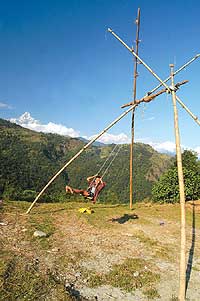 As we are dragged down this vortex of violence, we have been forced to shed our innocence. We were a country about which many have easily generalised about the generosity, tolerance and benevolence of its inhabitants. Nepalis were always quick to smile, bare our souls, say what we meant. Now there is only suspicion and fear. When we do restore peace, we don't know how long it will take before we regain the traits that were once a part of our national character.
As we are dragged down this vortex of violence, we have been forced to shed our innocence. We were a country about which many have easily generalised about the generosity, tolerance and benevolence of its inhabitants. Nepalis were always quick to smile, bare our souls, say what we meant. Now there is only suspicion and fear. When we do restore peace, we don't know how long it will take before we regain the traits that were once a part of our national character. But what makes us hopeful is when we come across people like the anonymous Nepali who dropped by the office last week to offer to sponsor the education of Reshma Singkhawal and her sister after reading our article 'Keep kids out of it' (#167). Nepal has been brutalised, but the inherent humanity and compassion of Nepalis still shines through. Despite the level of violence, what is surprising is the lack of bitterness and revenge among victims. Up the hill from the police station near Pokhara in which seven policemen and civilians were killed in a Maoist attack two weeks ago, we recently came across this boy on a swing to remind us of our dear Nepal of not so long ago. A Nepal that will swing back once this is all over.
There is one country in the world which says it has no need of an army: Costa Rica. Its pacifist constitution has barred the setting up of an armed force, and Costa Rica is a peaceful and prosperous country in a region of intense turmoil. Its president for many years, Oscar Arias, won the Nobel Peace Prize in 1987 for finding
a settlement in Central America based on the Contadora Plan.
As our own country sinks into a Latin America-style quagmire of insurgency, vigilantism, disappearances and human rights violations, it is useful to remember Arias\' words. Things may not be as bad in Nepal as El Salvador in the 1980s, but we are getting there. Negotiations take time and try our patience, Arias said, but they are the only way to resolve conflicts. "When faced with the roots of violence, which so often stem from poverty, hunger, and injustice, it is far more noble to address these issues than to keep pouring money into weapons," he said.
Here in Nepal, it is uncommon to find such common sense among those who call the shots. A few hundred people are taking us unwillingly down the path of violence and conflict. All other Nepalis disagree with their extreme methods, but cannot seem to collectively express opposition to a war fought in their name and in which they are overwhelmingly the victims.
Part of our job in the media is to not be cynical ourselves, to lessen despair and find hope where we can. Many say this is not the media's job: we are supposed to be observers, and we should just keep a body count. But while seeking truth, exposing cruelty and ugliness, journalists can't be fencesitters while their country self-destructs. We must have a bias in times of war: against violence, for peace and tolerance. A bias for truth and transparency.


